Intro
Track your babys growth with our week-by-week pregnancy stages guide, covering fetal development, symptoms, and milestones from conception to birth, including early signs, trimester updates, and parenting tips.
Pregnancy is a remarkable and complex process that transforms a woman's body in incredible ways. From the moment of conception, a series of intricate physical and hormonal changes occur, ultimately leading to the birth of a new life. Understanding the different stages of pregnancy is essential for expectant mothers, as it helps them prepare for the challenges and joys that lie ahead. In this article, we will delve into the fascinating world of pregnancy, exploring the various stages that occur week by week.
As the pregnancy journey begins, it's essential to recognize the significance of each stage. From the initial weeks of conception to the final stages of labor, every moment plays a vital role in the development of the fetus. The early weeks of pregnancy are crucial, as they lay the foundation for the growth and development of the baby. As the pregnancy progresses, the mother's body undergoes significant changes, preparing for the arrival of the new baby.
The journey of pregnancy is divided into three trimesters, each lasting approximately 13 weeks. The first trimester is a critical period, during which the fetus develops rapidly. The second trimester is often referred to as the "golden period" of pregnancy, as the mother's body has adjusted to the hormonal changes, and the baby's growth becomes more pronounced. The third trimester is the final stretch, as the mother's body prepares for labor and the baby's birth. In the following sections, we will explore each stage of pregnancy in detail, providing valuable insights and information for expectant mothers.
Pregnancy Stages: First Trimester
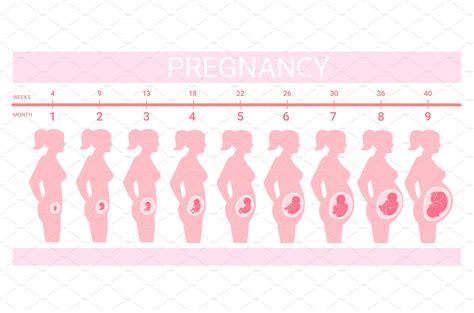
The first trimester of pregnancy spans from week 1 to week 12. During this period, the fetus develops rapidly, and the mother's body undergoes significant hormonal changes. The first trimester is divided into three months, with each month bringing new developments and challenges. In the first month, the fertilized egg implants itself in the uterus, and the embryo begins to develop. The second month sees the formation of the fetus's major organs and body systems. The third month is a critical period, as the fetus's growth accelerates, and the mother's body starts to show visible signs of pregnancy.
Week 1-4: Conception and Implantation
The journey of pregnancy begins with conception, which typically occurs when a sperm fertilizes an egg in the fallopian tube. The resulting zygote then travels down the fallopian tube and into the uterus, where it implants itself in the uterine lining. During this period, the mother may not even realize she is pregnant, as the symptoms are often mild and similar to those experienced during a regular menstrual cycle.Week 5-8: Embryonic Development
As the embryo develops, it begins to produce human chorionic gonadotropin (hCG), a hormone that helps maintain the pregnancy. The embryo's major organs and body systems start to form, including the heart, lungs, and liver. The mother may begin to experience morning sickness, fatigue, and mood swings due to the hormonal changes.Pregnancy Stages: Second Trimester
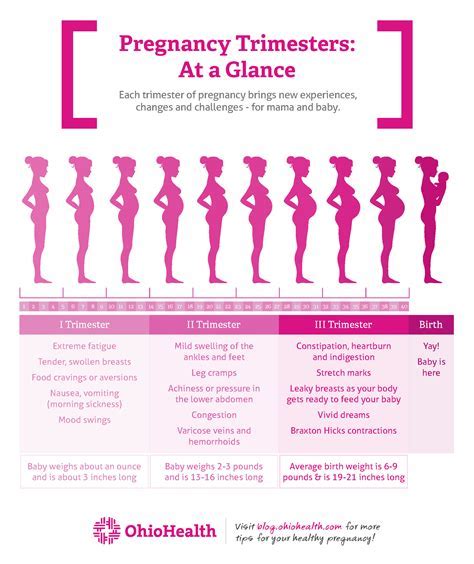
The second trimester of pregnancy spans from week 13 to week 26. This period is often referred to as the "golden period" of pregnancy, as the mother's body has adjusted to the hormonal changes, and the baby's growth becomes more pronounced. The second trimester is a critical period for fetal development, as the baby's senses, muscles, and nervous system continue to mature.
Week 13-16: Fetal Development
During this period, the fetus's skin starts to thicken, and fat layers form. The baby's senses become more developed, and it can detect light, sound, and touch. The mother may start to feel the baby's movements, which can be a thrilling experience.Week 17-20: Maternal Changes
As the pregnancy progresses, the mother's body undergoes significant changes. The uterus expands, and the mother's blood volume increases. The mother may experience back pain, pelvic pressure, and Braxton Hicks contractions, which are mild and irregular.Pregnancy Stages: Third Trimester
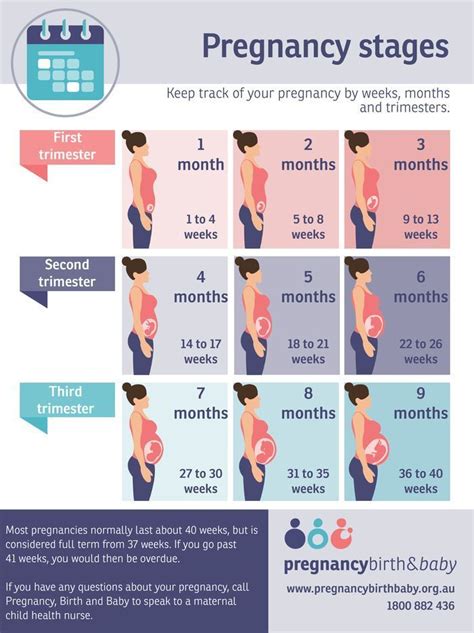
The third trimester of pregnancy spans from week 27 to week 40. This period is the final stretch, as the mother's body prepares for labor and the baby's birth. The third trimester is a critical period for fetal development, as the baby's lungs mature, and it prepares for life outside the womb.
Week 27-30: Fetal Preparation
During this period, the fetus's lungs continue to mature, and it starts to produce surfactant, a substance that helps the lungs expand and contract properly after birth. The baby's skeleton changes from soft cartilage to bone, and it starts to store fat for energy.Week 31-34: Maternal Preparation
As the pregnancy progresses, the mother's body prepares for labor. The cervix begins to dilate, and the mother may experience more frequent and intense Braxton Hicks contractions. The mother should start to prepare for the birth, attending prenatal classes, and creating a birth plan.Pregnancy Complications and Concerns
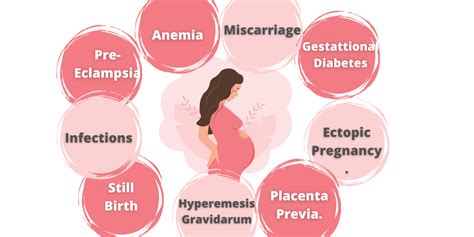
While pregnancy is a natural process, it's not without its complications and concerns. Expectant mothers should be aware of the potential risks and take steps to minimize them. Some common pregnancy complications include gestational diabetes, preeclampsia, and placenta previa. Regular prenatal check-ups and a healthy lifestyle can help reduce the risk of these complications.
Gestational Diabetes
Gestational diabetes is a condition that occurs during pregnancy, where the mother's body is unable to produce enough insulin. This can lead to high blood sugar levels, which can be harmful to the baby. Expectant mothers can reduce the risk of gestational diabetes by maintaining a healthy weight, exercising regularly, and eating a balanced diet.Preeclampsia
Preeclampsia is a condition that occurs when the mother's blood pressure becomes too high. This can lead to damage to the kidneys, liver, and brain, and can be life-threatening for both the mother and the baby. Expectant mothers should monitor their blood pressure regularly and report any concerns to their healthcare provider.Pregnancy Nutrition and Lifestyle
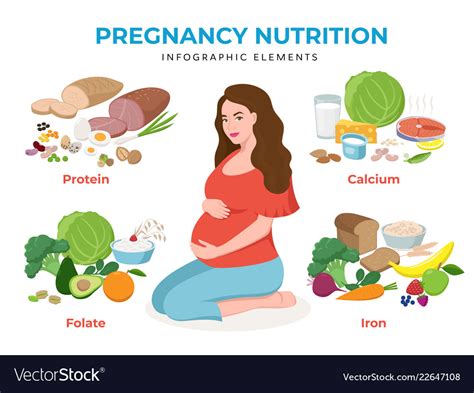
A healthy pregnancy requires a balanced diet and lifestyle. Expectant mothers should focus on consuming essential nutrients, such as folic acid, iron, and calcium. A healthy diet should include plenty of fruits, vegetables, whole grains, and lean protein sources. Regular exercise, such as walking or prenatal yoga, can also help reduce the risk of pregnancy complications and improve overall health.
Essential Nutrients
Folic acid is an essential nutrient that helps prevent birth defects, such as spina bifida. Iron is crucial for the production of red blood cells, which carry oxygen to the baby. Calcium is essential for the development of the baby's bones, teeth, and muscles. Expectant mothers should consult with their healthcare provider to determine the best nutrition plan for their individual needs.Regular Exercise
Regular exercise during pregnancy can help reduce the risk of gestational diabetes, preeclampsia, and other complications. Exercise can also improve mood, reduce stress, and increase energy levels. Expectant mothers should choose low-impact exercises, such as walking, swimming, or prenatal yoga, and avoid high-impact activities that can cause injury.What are the signs of pregnancy?
+The signs of pregnancy can vary from woman to woman, but common symptoms include morning sickness, fatigue, mood swings, and breast tenderness.
How often should I attend prenatal check-ups?
+Expectant mothers should attend prenatal check-ups regularly, ideally every 4-6 weeks, to monitor the baby's growth and detect any potential complications early.
What are the risks of gestational diabetes?
+Gestational diabetes can increase the risk of complications during pregnancy, such as preeclampsia, and can also affect the baby's health, increasing the risk of birth defects and low blood sugar.
As we conclude our journey through the stages of pregnancy, we hope that expectant mothers have gained valuable insights and information to help them navigate this incredible journey. Pregnancy is a unique and individual experience, and every woman's journey is different. By understanding the various stages of pregnancy, expectant mothers can better prepare themselves for the challenges and joys that lie ahead. We invite our readers to share their own pregnancy experiences, ask questions, and seek advice from our community of expectant mothers and healthcare professionals. Together, we can create a supportive and informative environment that empowers women to have a healthy and happy pregnancy.
